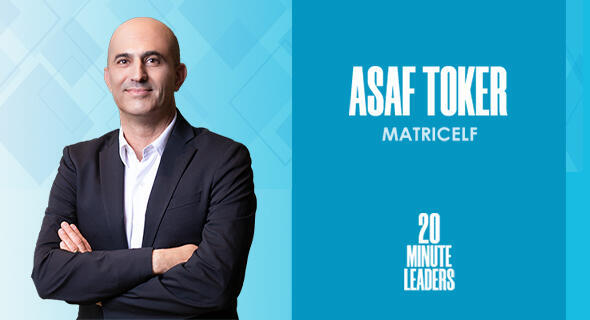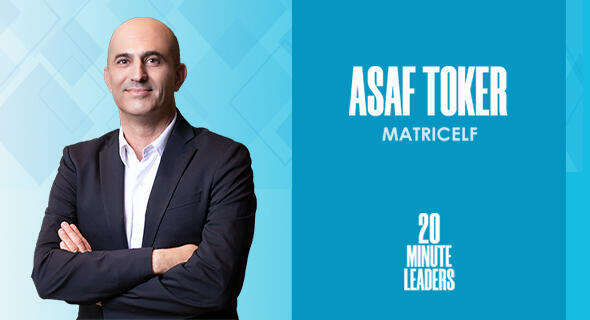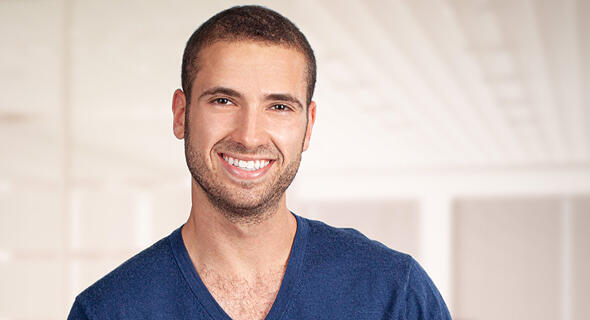
20-Minute Leaders
“It's good for your well-being to do something that you really love doing.”
Though he has taken on many additional roles in the medical and startup worlds, Matricelf CEO Asaf Toker has not stopped being a pediatrician.
Though he has taken on many additional roles in the medical and startup worlds, Asaf Toker has not stopped being a pediatrician. He shares that it is important for your well-being to do something you really enjoy, and he has fun treating kids and their families. Having fun and being a good person are the goals that have guided his career and led him to being CEO of Matricelf. It is a tissue engineering company creating implants that come from a patient’s own cells, solving the immune response problem in traditional implants, Toker says. While the company can create any kind of tissue, they are focusing on the area of spinal cord injuries first. He believes they can improve the lives of millions of patients. He shares that part of the reason they are on the road to success is that the team at Matricelf works well together and has fun.
Tell me about yourself as a doctor. It's something that you've kept no matter what else you've done professionally.
As a pediatrician, it always amazes me that you're not only treating the kid—which is usually a small kid who cannot tell you what he is feeling—you're also treating the parents. You basically treat two at the price of one because you treat both sides. Most of the time, we're not treating some critically ill kids, fortunately enough. But even when a kid comes with a runny nose and the parents are very worried, when you see that they are going out with a smile on their faces, you understand that you did a good job. The reward is quite fast with kids. And you can be a kid yourself when you treat them. So it's fun work. I really love it.
Even though you've done other incredible things—whether it's working as an executive within hospitals, being in the VCs, startup manager—you still kept being a physician. Obviously, it takes away focus. It's an incredible thing that you're helping, but it takes away focus. Yet you're still making sure that you're dedicating yourself to doing that in parallel with other things. Why is that?
I think that it makes me a better physician and it also makes me a better manager. Some people do running as a hobby or judo or playing the piano; my hobby is being a physician. It's good for your well-being to do something that you really love doing. It's good for you in your personal life, it's good for you as a physician, and it's good for me as a manager. As a side product, all my employees have a pediatrician they can consult whenever they have a question on their kids.
Tell me about Matricelf and how you've sort of paved your way to this company.
Matricelf is a tissue engineering company. Other companies usually use synthetic materials as their matrix or cells from a different donor for their cellular part of the tissue, but Matricelf is building tissues in which both the cells and the matrix are coming from the patient themselves. In our implants, there is basically no immune response, which is a very, very important problem in organ implants. We believe that we are solving it.
Can you tell me a little bit more about this problem about immune response? Essentially, what you're talking about is the ability for our immune system to accept tissues that are not created originally by us. Right?
When you expose the human body to a foreign object, the response of the human immune system is basically to attack this foreign object. Therefore, people that are undergoing any transplant of any organ usually take an immunosuppressant. What Matricelf is doing is developing complete autologous implants in which the whole implant originates from the patient's own biomass. There is no immune response to these implants, and therefore you don't need to take immunosuppressants. The probability of those implants being accepted by the body is much higher.
What are some contributing reasons to the complexity of what you're building here?
Most companies use synthetic materials for their scaffold. We managed to build a scaffold, on which the cells actually build the tissue, that originated from the patient themselves. And the cellular part we are also building from the patient's own cells, so we basically managed to build an implant that fully originated from the patient. For the first time, we are offering a complete 3D functioning autologous tissue. We can basically create any tissue that we would like to create.
The first indication that we're taking to the market is spinal cord injury, which unfortunately has a huge market. There are thousands of patients with a spinal cord injury, usually due to a traumatic accident. We're basically building neural implants that will replace the damaged tissue in the spine, and hopefully we'll help those patients to regain motor, sensor, and autonomic functions.
Where are we currently in this landscape of technology and humans and spinal cord injuries?
For many years, many companies tried to solve this problem and, unfortunately, were not successful. But as time progresses, we believe that we get more and more knowledge on how the nervous system works and how to try and solve the problems that were previously related to those trials.
For example, one of the problems is that in the area of the injury, there is basically scar tissue that prevents the neural signaling from passing through the spinal cord. We are one of the companies that are trying tissue implants. Basically, after taking out the scarring tissue, we are building a new neural tissue that will basically substitute the damaged tissue. I personally believe that we are on our way to changing the lives of millions of patients all over the world. For a quadriplegic patient, to be able to take out his iPhone and text somebody or to be able to eat by himself, it's a game-changer.
How do we transition from research or an idea to a full-on product that works with hospitals and clinics?
First of all, we have a proof of concept in animals, which is a good start. Last year, we did the pre-R&D meeting with the FDA to basically present our R&D program and get their feedback. So we aligned our R&D program according to this pre-R&D meeting. We are following our roadmap, doing all the necessary trials and animal trials toward the first human clinical trials that are currently planned for the beginning of 2025. With great technology and, equally important, an amazing team of scientists, we truly believe that we are going to change the world.
You mentioned you're 11 people strong now at Matricelf. What is the makeup of this group? What kind of family did you create here?
First of all, eight out of the 11 are women. We have an amazing team of R&D personnel, lab employees, financials, operational. I truly believe that once you create an elite team that works together and, more importantly, has fun doing it, you have a major part of the road to success.
To wrap up my understanding of you a little bit, you’ve been a pediatrician, a VC, an executive at a hospital, and a startup entrepreneur. Is there a common thread in your eyes to the way that you're choosing to spend your career?
I always tell my kids that on your last day here, you should look in the mirror and say to yourself that you were, first of all, a good person and, second of all, that you had fun. I tried very hard to be a good person, and I try to have fun living life, working my career. I try to choose adventures that combine those two.
Michael Matias, Forbes 30 Under 30, is the author of Age is Only an Int: Lessons I Learned as a Young Entrepreneur. He studies Artificial Intelligence at Stanford University, is a Venture Partner at J-Ventures and was an engineer at Hippo Insurance. Matias previously served as an officer in the 8200 unit. 20MinuteLeaders is a tech entrepreneurship interview series featuring one-on-one interviews with fascinating founders, innovators and thought leaders sharing their journeys and experiences.
Contributing editors: Michael Matias, Megan Ryan















